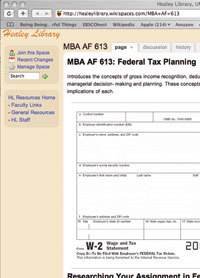The start of a new fall semester is often seen as a time to reunite with fellow classmates, drop and swap classes and break in those just-bought textbooks. September’s first few weeks can be some of the most relaxed seen in academic careers. However, the calm is quickly shattered by the arrival of the year’s first major research paper. That’s where the Healy Library can help.
“Our goal is for no student to ever say, ‘I didn’t know what’s in the library,'” George Hart, interim associate director of Healey Library, said. “We don’t want anyone getting frustrated when confronted with a research project.”
This year alone, the library has spent more than $1 million on databases and electronic resources, which will be available to students this fall.
Evidence of this can be seen in Healey Library’s new online Wikispace: part at-home library, part syllabi organizer and part personal librarian, all at once. The library hopes that this will improve students’ understanding of their courses and make staying in touch with material and assignments easier.
Busy college students can become crunched for time and overrun with due dates. For this reason, many have resorted to using the Internet as their main, albeit makeshift research tool. For example, some use Wikipedia.org, the controversial free encyclopedia, as well as the Internet’s largest and most extensive example of a wiki.
A wiki is a content delivery system comprised of easily-accessed and edited pages, and in the case of Wikipedia, it may be a last-minute study crutch. However, unlike Wikipedia, the credibility of which is debated frequently, UMass Boston’s Wikispace is the real deal, drawing its material from only the most authoritative and respected sources.
“This is especially useful for those students whose professors require primary sources,” Hart said, demonstrating by clicking open a scanned article from the Boston Globe historical newspaper, 1873.
The wikis can be accessed at www.lib.umb.edu/wikis, or from Healey Library’s main website. In addition to subject guides ranging from accounting to sociology, the library’s website boasts a growing database of more than 300 course pages, compiled by members of the Reference Outreach and Instruction Department.
In addition to course syllabi, the wikisites are filled with reading lists, links to databases like JSTOR, full-text articles, newspaper collections, e-books and access to the catalogues of all the libraries in Boston Library Consortium. It serves to be like one-stop shopping for research paper assignments.
“With these new wikipages, we are out in the forefront of all other colleges nationwide,” Janet DiPaolo, coordinator of Healey Library’s instruction program, said.
For those who like wandering through rows of books and quietly working in the Healey Library, six new group study rooms have been opened to provide a designated space for collaboration. In addition to this, laptops and PDAs are rented out at the Media Service desk on the third floor for $4.
The library hopes that their efforts will translate into making academic study less intimidating and more accessible to a greater range of students.
“This all pulls into the idea of how we can contribute to our university’s mission of retaining students,” Hart said.

